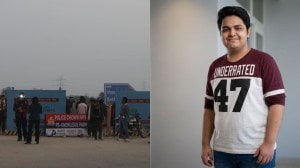Working women
EACH of the 42 houses in Zavernagar in Varvala village today has rainwater harvesting. Each woman has a bank account, the village has got it...

EACH of the 42 houses in Zavernagar in Varvala village today has rainwater harvesting. Each woman has a bank account, the village has got its second primary school and it8217;s now connected to the main road.
This is the same village where two pregnant women died eight years ago because they could not reach the hospital in the rains8212;the village had no road.
What separates the now from the then is the setting up of three mahila mandals. Prompted by D S Ker, a professor of economics who took voluntary retirement in the late Eighties, and Anandi8212;an all-woman group working for empowerment in rural Gujarat8212;the women in the village are now leading from the front.
The first mandal to be formed8212;Khodiyar Bachat Mandal8212;had only middle-aged illiterate members. Sarswati Bachat Mandal, the last of the three, has young members, some of them literate. What is common to them is their awareness level. They have even forced fair price shops to display stocks prominently on notice boards.
Ker began by founding yuva mandals but met with little success. 8216;8216;Men lack dedication and zeal to bring about a change.8217;8217; When Anandi pitched in, efforts of the Gram Vikas Trust, Ker8217;s organisation, started to bear fruit.
Today, 105 mahila mandals in 42 villages of Okha taluka have become agents of change. Raising their voice on issues like health, cleanliness, family and child welfare, and education, the mandals have scripted a story no one imagined a few years ago in the backward coastal belt.
Ker recalls how difficult it was to form mahila mandals in these male-dominated villages. His daughter Mita began by convincing women from Shivrajpur village. 8216;8216;Initially, I was doubtful but now I8217;ve more faith in women,8217;8217; Ker says.8217;8217;
8216;8216;We no more borrow money from moneylenders on high interest rates. We8217;ve a first aid box, all children go to school, all of us have a bank account and even the elders turn to us for advice,8217;8217; says Rupiben. 8216;8216;We8217;ve got a whole new identity,8217;8217; says a confident Somiben Chauhan, a member of Ghelai Bachat Mandal.
All the mandals meet once a month. Ker organises workshops and field visits for women to broaden their understanding of issues.
Interestingly, Ker8217;s social engineering also involves people to stem salinity ingress in the coastal belt. The Gram Vikas Trust has deepened a number of lakes and farm ponds in the region to recharge them with rain water. From government and private funds, the trust has built a five-km long wall, about 10-feet high, to prevent rain water from flowing into the sea.
Ker is now toying with the idea of roping in the mahila mandals in his fight against the natural enemy. 8216;8216;I8217;m wondering how to get the women involved in checking salinity ingress. I quite strongly believe that without empowering women you can not win the bigger war.8217;8217;
- 01
- 02
- 03
- 04
- 05































